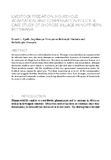Please use this identifier to cite or link to this item:
http://hdl.handle.net/10311/1349| Title: | Livestock predation, household adaptation and compensation policy: a case study of Shorobe village in the northern Botswana |
| Authors: | Kgathi, Donald L. Mmopelwa, Gagoitseope Mashabe, Baitshephi Mosepele, Ketlhatlogile |
| Keywords: | Human- wildlife conflict compensation livestock predation farmers |
| Issue Date: | 28-Jun-2012 |
| Publisher: | Taylor & Francis, http://www.tandfonline.com/loi/ragr20 |
| Citation: | Kgathi, Donald L. et.al (2012) Livestock predation, household adaptation and compensation policy: a case study of Shorobe village in northern Botswana, Agrekon: Agricultural Economics Research, Policy and Practice in Southern Africa, Vol. 51, No. 12, pp. 22-37 |
| Abstract: | Human-wildlife conflict is a worldwide phenomenon. Through a household survey supplemented by informal interviews, this study attempts to understand the dynamics of livestock predation by carnivores at village level in Botswana. The study reveals that farmers perceive hyenas and lions to cause more livestock losses than other predators. In order to reduce predation, attempts should be made to put livestock in enclosures at night and also to herd them during the day. These practices comply with the conditions of the new government compensation policy for livestock losses caused by carnivores. The study recommends a review of the compensation rates and suggests that they should be closer to the market value. Such changes, accompanied by strict animal husbandry practices, may bring about the increased willingness of households to co-exist with predators. |
| URI: | http://hdl.handle.net/10311/1349 |
| ISSN: | 2078-0400 (Online) 2078-0400 (Online) |
| Appears in Collections: | Research articles (ORI) |
Files in This Item:
| File | Description | Size | Format | |
|---|---|---|---|---|
| Kgathi D.L_ TFR_2012.pdf | Main Article | 646.98 kB | Adobe PDF |  View/Open |
Items in DSpace are protected by copyright, with all rights reserved, unless otherwise indicated.
